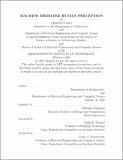Machine mediated human perception
Author(s)
Liang, Qianhui,S.M.Massachusetts Institute of Technology.
Download1237145968-MIT.pdf (45.32Mb)
Other Contributors
Massachusetts Institute of Technology. Department of Architecture.
Massachusetts Institute of Technology. Department of Electrical Engineering and Computer Science.
Advisor
Takehiko Nagakura.
Terms of use
Metadata
Show full item recordAbstract
'The broader one's understanding of the human experience, the better design we will have.' --Steve Jobs In recent decades, there has been a growing interest in designing places through the lenses of the human experience. However, research on the relationship between the physical environment and its influence on human perception has been constrained. The constraint is partially due to the difficulty of assessing perception and physical features through objective mathematical models. The idea of this thesis is to explore how machine learning can contribute to better integration of previously unquantifiable human perception with urban theories matrix in the design process: In particular, the thesis will investigate the relationship between the built environment features and the human's perception at the street level. The thesis explore machine learning methodologies, combining computer vision's application in modeling building features, in assessment of urban landscape liveliness: Taking the central area of Shanghai as the experimental site, the thesis designs a crowd-sourcing platform to collect residents' perception of streets in Shanghai by evaluating street spaces displayed in the form of rendered 3D model scenes and panoramic videos. I revisit urban study principles to define a matrix of spatial features and simulate such perceptions through a machine learning approach. This AI-assisted pipeline will shed light on how features of the urban environment influence individuals' perceptions and to further assist with decision-making toward human-centered urban design.
Description
Thesis: S.M., Massachusetts Institute of Technology, Department of Architecture, September, February, 2020 Thesis: S.M., Massachusetts Institute of Technology, Department of Electrical Engineering and Computer Science, February, 2020 Cataloged from student-submitted PDF of thesis. Includes bibliographical references (pages 71-76).
Date issued
2020Department
Massachusetts Institute of Technology. Department of Architecture; Massachusetts Institute of Technology. Department of Electrical Engineering and Computer SciencePublisher
Massachusetts Institute of Technology
Keywords
Architecture., Electrical Engineering and Computer Science.